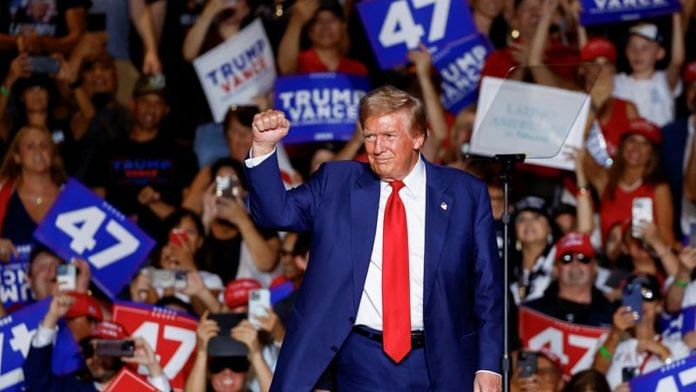


The gradual unfolding of United States President-elect Donald Trump’s team will acquire finality in the coming weeks. Going by the straws in the wind, it is not difficult to determine what is to come. Whatever may be the final team, the perception that Trump 2.0 will bear a heavy anti-China stamp is gaining ground.
Sixty-seven-year-old Susie Wiles, Trump’s former campaign manager and hardliner on China whom he called “Ice Maiden”, was appointed as White House Chief of Staff. Marco Rubio, another hardliner against Beijing, is vice-chairman of the Senate Select Committee on Intelligence and senior member of the Senate Committee on Foreign Relations. In 2023, he released a 328-page report claiming that the Covid-19 virus was released from a Chinese government-run lab in Wuhan. Beijing has imposed a travel ban on him for saying: “The Chinese Communist Party (CCP) doesn’t believe in simple principles like religious liberty, the right to free speech, democratic elections. Their willingness to undermine all of the institutions and the norms of the world to fulfill this ambition (to become the world’s most powerful nation) is without a doubt the singular geopolitical issue of the 21st century.” This is whom the Chinese will have to deal with. Of course, after lifting the travel ban.
Besides cleaning up the domestic administrative system, Trump also promised to bring manufacturing back to America through his Make America Great Again (MAGA) campaign, a virtual revival of “Be American Buy American” propelled by the Build America Buy America Act of November 2021. Additionally, a massive tariff war is likely to be unleashed by the Trump administration, severely impacting US-China trade. Beijing has already flagged this issue in its economic planning. The property slump and excess steel production are imposing a heavy debt burden on some state enterprises and construction conglomerates requiring huge centralised fiscal assistance. This is sure to burn a hole in its reserves, which, in turn, will expose the soft underbelly of the Chinese financial system to external uncertainties.
Ideally, Beijing should be in jitters over Trump’s anti-China team, but it appears that it already has a plan B in place. Tesla CEO Elon Musk’s overwhelming support to Trump during the campaign was one important factor in influencing the election results. The natural corollary of this bonhomie is the exalted position that Musk and his SpaceX would get in the Trump administration. Trump has said that Musk will be the deputy leader of the Department of Government Efficiency (DOGE) mandated to oversee changes to regulations as well as downsizing of federal agencies, a promise the President-elect made in his campaign speeches. Incidentally, the MAGA campaign essentially involves a massive increase in tariffs.
Meanwhile, with a huge “Gigafactory” of Tesla in China, Elon Musk’s close relationship with some of the high officials, including Premier Li Qiang, could be the ladder for Beijing to insulate itself against the proposed tough stand by Trump.
Also read: Why you shouldn’t count on Donald Trump to end the wars
While Trump’s team includes ‘China hawks’, the significant question is how pro-India his policies would be. A strong dollar, anti-immigration policies, reduction in H-1B visa, and high tariffs would be detrimental to India’s manufacturing and imports. seriously affecting the ambitious ‘Make in India’ dreams. Evaluating Trump’s team only from the US-China relations prism would be a serious error of judgement leading to misplaced euphoria and flawed foreign and economic policies.
US presidents have the prerogative to pick and choose persons of their choice as team members, be they friends, supporters or loyalists.
Abraham Lincoln, ranked one of the best presidents of America who led the country at a very testing time of violent rebellions, racial divide, and social upheaval, chose a team consisting of rivals whom he defeated and those who vehemently disagreed with him. There are remarkable parallels between the 16th and the 47th presidencies, though America and the rest of the world have moved far beyond what they were in 1860.
New Delhi needs to strengthen the India caucus team in the US, enlist more supporters and keep a close watch on Trump’s list as the appointment process unfolds. We may not have enough clout to appoint ‘rivals’ in Trump’s cabinet, but we certainly can look for pro-India members who would know where our interests concur. Besides identifying leverages to negotiate from a position of strength, the personal camaraderie between Prime Minister Narendra Modi and President Donald Trump will have to used to the hilt to gain maximum advantage during Trump 2.0.
The author is the former editor of ‘Organiser’. He tweets @seshadrichari. Views are personal.
(Edited by Humra Laeeq)



